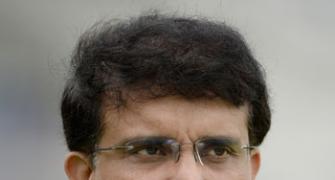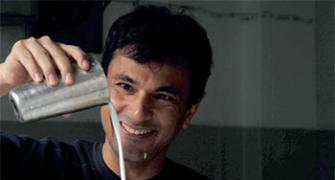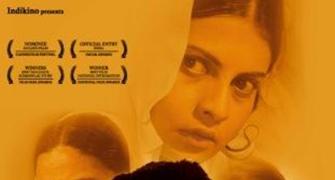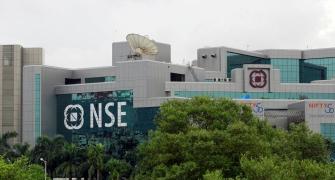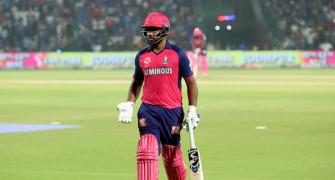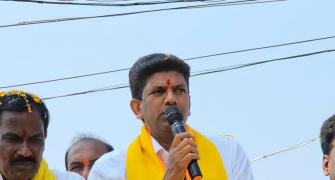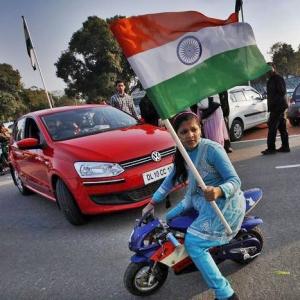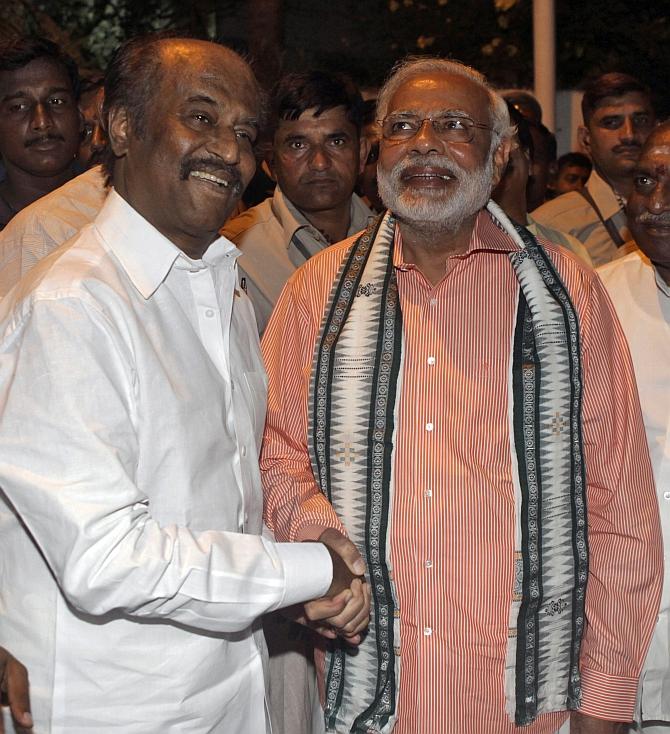 In Tamil Nadu, the alternative to one Dravidian party has been another, and for one actor-politician CM, there is another. Their initial popularity may owe to their filmi charisma, but their continued acceptance owed to their government’s policies and programmes targeting the poor and the needy in the state, says N Sathiya Moorthy.
In Tamil Nadu, the alternative to one Dravidian party has been another, and for one actor-politician CM, there is another. Their initial popularity may owe to their filmi charisma, but their continued acceptance owed to their government’s policies and programmes targeting the poor and the needy in the state, says N Sathiya Moorthy.
On his 60th birthday on November 7, Tamil cinema’s ever-green actor Kamal Haasan signed up for Prime Minister Narendra Modi’s ‘Swachh Bharat’ (‘clean India) campaign. With that, he also took with him, his fan-following under the ‘Kamal Haasan Narpani Mandram’ (welfare club).
It is one thing that Modi promptly tweeted Kamal’s initiative, but the actor clarified that there was ‘no political philosophy’ behind it. A self-acknowledged non-believer, who otherwise swears by Dravidian icon, ‘Periyar’ E V Ramaswamy Naicker, Kamal obviously wanted to send out a clear message that his joining the ‘Clean India’ campaign did not mean that he approved of Modi/Bharatiya Janata Party’s ‘Hindutva’ agenda or any other.
It did not mean much in political terms as Kamal Haasan, almost since the start of the welfare club named after him, had made it clear to his fans that entering politics was not his cup of tea. In comparison, Tamil cinema’s other ‘super-star’ Rajnikanth, often accused of using his film-releases to send out a ‘political message’ to garner additional expectation at the box-office, has stayed away from his fans and crowds on his birthday (December 12) for years now.
But where their fans excel is in quietly reaching out to the needy in their own ways. For decades now, Kamal’s fans, at his specific instance, have been organising ‘blood donation camps’ across the state on his birthday.
Ask doctors and nursing homes in rural Tamil Nadu, and they would tell you how the fans of the two actors could be counted upon for donating, or organising the donation of blood for emergency surgeries -- and also help out those in need.
Over the years, unending bouts of cynical criticism and academic research have spoken of the ‘star-power’ on the streets of the south Indian state. It had started with the advent of the ‘Dravidian movement’, particularly the Dravida Munnetra Kazhagam accession to elected power in Tamil Nadu in 1967, on what was seen as the strength of its leadership’s demagogy and powerful film dialogues, particularly of DMK founder, the late C N Annadurai and his successor, M Karunanidhi.
The cynicism only grew with the coming to power of the late M G Ramachandran, ‘MGR’ in short, with his break-away All India Anna Dravida Munnetra Kazhagam. Now, with J Jayalalithaa ruling the roost in government and out of it, particularly after a Bangalore court verdict caused her to lose the chief ministerial post, the nation seems to be looking at the ‘literate’ south Indian state, rather disapprovingly.
Kamal signing in for the clean India campaign may thus have made a marginal difference in national perception even. It’s more so, considering in particular the fact that some of the younger generation stars after the Kamal-Rajni era were seen protesting with Jaya’s AIADMK cadres against her conviction and imprisonment.
All these stars and the rest of the Tamil filmdom -- at times, including Rajni and Kamal -- have also joined various public/political protests (though separately) on various ‘pan-Tamil issues’, be it river water disputes with the neighbouring states of Karnataka and Kerala, or on ‘Sri Lankan Tamil concerns’.
It’s not often understood in the rest of the country that star-power of the Annadurai, Karunanidhi, MGR and Jayalalithaa kind go only as for as helping in easy ‘face-recognition’ compared to the rest of the state’s polity.
In national terms, it would compare with the initial advantage that a Nehru-Gandhi family member has had over the long years that the likes of the Vajpayee-Advani duo required for marketing their ‘thrice-born’ party and win just a third of all Lok Sabha seats, both in 1998 and 1999 elections.
The BJP thus needed a new and ‘proven face’ in Narendra Modi, and a heavily-tilted and at times wholly-motivated campaign to wrest the electoral initiative from the Congress and the Nehru-Gandhi family.
In Tamil Nadu, the alternative to one Dravidian party has been another, and for one actor-politician CM, there is another. Their initial popularity may owe to their filmi charisma, but their continued acceptance owed to their government’s policies and programmes targeting the poor and the needy in the state.
It was thus that the early DMK governments of Annadurai and Karunanidhi are remembered for improving rural transport network, rural electrification, housing as much in urban areas as it used to be in the rural districts under the predecessor Congress regime.
MGR took ‘mini-buses’ even to interior villages. Today, under Jaya’s ‘small bus scheme’, where there are roads, larger -- though ill-maintained -- buses ply. Where there are no roads, the ‘small bus’ is there for a fixed rate for the passenger.
The poor in the state are satisfied when they get free rice, free televisions, free LPG connection, (under Karunanidhi rule), free mixies and grinders, and ‘Amma canteen’, ‘Amma water’, and ‘Amma cinemas’ when Jaya returned to power.
It’s all aimed at the housewife from poorer neighbourhoods. The poor man’s logic is not complicated as that of the erudite economist. For him -- or, her -- if he has to pay more for power and water, rice and milk from out of his meagre and near-fixed income, whose real value only keeps going down, then a free laptop for his school-going son or daughter, or even a free TV set for the entire family would be a welcome substitute.
MGR proved the reverse during his 10 long years in office. Throughout those turbulent years for the Indian economy, rice and milk prices, power tariff and bus fares in the state were stable.
MGR’s ‘nutritious noon meal scheme’, much criticised when launched, became a UN-acknowledged model for the developing world. So have the free rice scheme and the ‘Amma canteens’ inspired other state and national governments here and elsewhere.
Before DMK and Karunanidhi, the AIADMK and MGR, the late Congress chief minister K Kamaraj had made a difference to the way political administrators in the country thought about the poor.
The free school education and the free noon meal scheme that his government introduced in the fifties are now all but forgotten. While the free education scheme flourished, the meal scheme died its natural death during the drought years of the sixties, owing to voluntary donations on which it was based.
The scheme required and has also grown with budgetary support after MGR revived it years later. The state’s poor too have grown with it.
Image: Rajnikanth meets Narendra Modi
N Sathiya Moorthy, veteran journalist and political analyst, is director, Chennai Chapter of the Observer Research Foundation.

